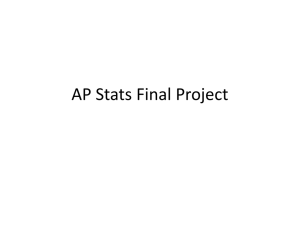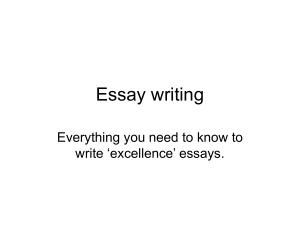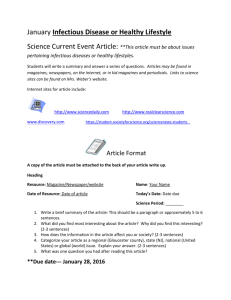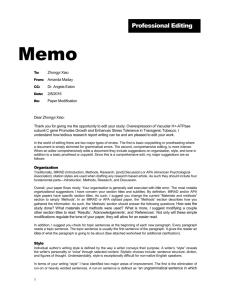Hi, M-----. Welcome back to e-tutor. I`m S---
advertisement
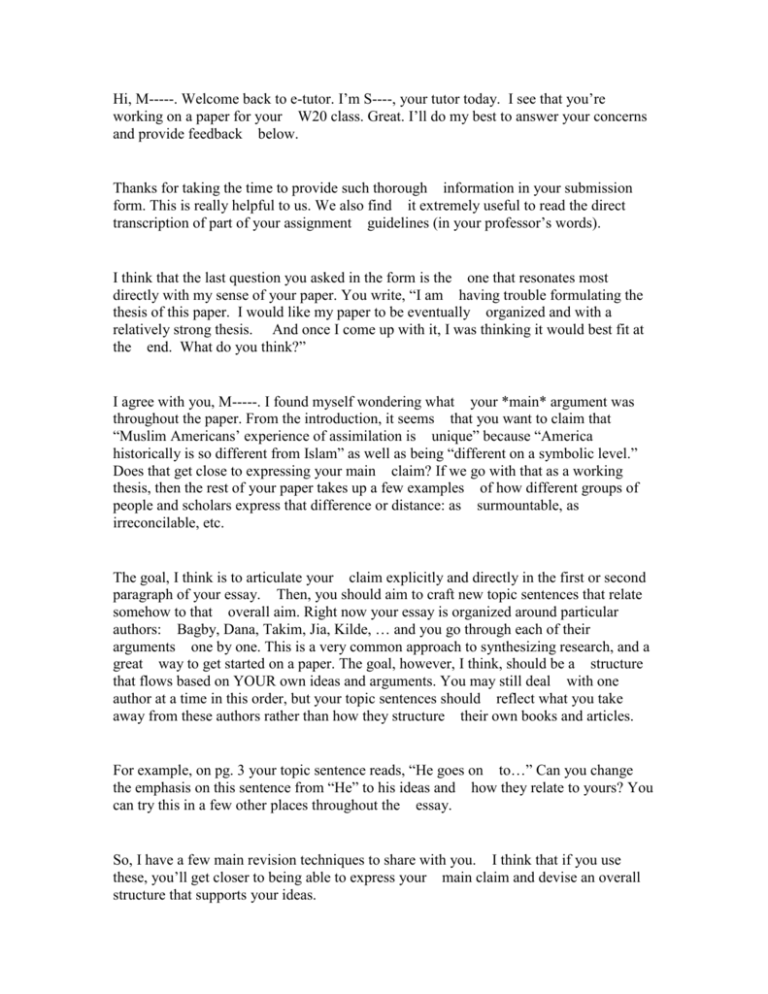
Hi, M-----. Welcome back to e-tutor. I’m S----, your tutor today. I see that you’re working on a paper for your W20 class. Great. I’ll do my best to answer your concerns and provide feedback below. Thanks for taking the time to provide such thorough information in your submission form. This is really helpful to us. We also find it extremely useful to read the direct transcription of part of your assignment guidelines (in your professor’s words). I think that the last question you asked in the form is the one that resonates most directly with my sense of your paper. You write, “I am having trouble formulating the thesis of this paper. I would like my paper to be eventually organized and with a relatively strong thesis. And once I come up with it, I was thinking it would best fit at the end. What do you think?” I agree with you, M-----. I found myself wondering what your *main* argument was throughout the paper. From the introduction, it seems that you want to claim that “Muslim Americans’ experience of assimilation is unique” because “America historically is so different from Islam” as well as being “different on a symbolic level.” Does that get close to expressing your main claim? If we go with that as a working thesis, then the rest of your paper takes up a few examples of how different groups of people and scholars express that difference or distance: as surmountable, as irreconcilable, etc. The goal, I think is to articulate your claim explicitly and directly in the first or second paragraph of your essay. Then, you should aim to craft new topic sentences that relate somehow to that overall aim. Right now your essay is organized around particular authors: Bagby, Dana, Takim, Jia, Kilde, … and you go through each of their arguments one by one. This is a very common approach to synthesizing research, and a great way to get started on a paper. The goal, however, I think, should be a structure that flows based on YOUR own ideas and arguments. You may still deal with one author at a time in this order, but your topic sentences should reflect what you take away from these authors rather than how they structure their own books and articles. For example, on pg. 3 your topic sentence reads, “He goes on to…” Can you change the emphasis on this sentence from “He” to his ideas and how they relate to yours? You can try this in a few other places throughout the essay. So, I have a few main revision techniques to share with you. I think that if you use these, you’ll get closer to being able to express your main claim and devise an overall structure that supports your ideas. 1) Brainstorm possible main claims. Read your paper out loud and use a highlighter to mark the most important ideas that come FROM YOU. Don’t highlight anything that comes from another author. For more guidelines about main claims see this handout: http://twp.duke.edu/uploads/assets/developing%20a%20central%20claim.pdf 2) Create a reverse outline of your essay. A reverse outline can help you figure out what you’ve written, the order it appears in, and how each paragraph relates to the next. It’s quick and extremely effective. Learn more here: http://twp.duke.edu/uploads/assets/reverse_outline.pdf 3) Finally, work hard on the structure of each paragraph. Make sure that you know how it relates back to the main claim you’re making. Learn more about how to create strong paragraphs and transitions here: http://twp.duke.edu/uploads/assets/meal_plan.pdf and http://writingcenter.unc.edu/resources/handouts-demos/writing-the-paper/transitions Ok, Michael. I hope this information is helpful. Thanks for using the writing studio today and happy revising! Best, S----- Hi, J-----. Welcome back to the E-Tutor. This is Tutor X again, and I’m so pleased to be reading another one of your drafts. I see you have concerns about the introduction, writing style, and any general problems with the writing, as well as sentence structure. Here are some comments to help as you continue to work on your draft. Please note that, as with any Writing Studio session, my comments reflect the perspective of only one person and are not intended to be prescriptive – any choices you make about revision are of course up to you. J-----, I enjoyed reading your draft, which I found genuinely interesting and intellectually engaging. Introduction In general, I found your first paragraph easy to read and to follow. There were a few places where I had some questions, so I’ll point them out. I had a question about the first sentence: “Historically, newborn babies diagnosed with Down’s syndrome, Spina bifida or other serious illnesses were left untreated and in most cases, these babies died within a few days.” I wondered when this was: when you say “historically,” what time period do you mean? Surely this isn’t the case now? I also had a question about the next sentence: “This common practice raises the ethical issue of what factors should go into consideration when the parents or the physicians make these decisions.” My question here was about the verb tense near the beginning: “raises.” Is this a common practice today? If that’s the case, then the present tense (raises) is appropriate. If it was a common practice in the past, then the simple past tense (raised) is appropriate. When I think about these two sentences together, I’m a little confused about how they fit together. Were impaired newborns left untreated in the past? And then consequently they died? If that’s the case, then what is it about the current situation that raises ethical issues? Style One thing I noticed that might be helpful for you is the issue of run-on sentences (which are also sometimes called fused sentences). In this situation, two or more complete sentences appear together as one sentence, with being separated properly. Here’s an example from your first paragraph: “Who ultimately makes the decision does not matter, since a decision has to be made, what is more important is what guidelines should be followed when such decisions are made.” In this run-on sentence, I’m not sure where the sentence break should be. It could be BEFORE “since a decision has to be made,” like this: “Who ultimately makes the decision does not matter. Since a decision has to be made, what is more important is what guidelines should be followed when such decisions are made.” Alternatively, the sentence break could go AFTER “since a decision has to be made,” like this: “Who ultimately makes the decision does not matter, since a decision has to be made. What is more important is what guidelines should be followed when such decisions are made.” Which one do you think better captures your meaning? Here’s another run-on sentence I noticed, from the bottom of p. 3-top of p. 4: “In these situations, Arras believes the best-interest standard has been pushed beyond its limits and the child is not gaining anything besides simply “being there”, he does not have the ability to think, to communicate, and more importantly, to give and receive love, all of these are very important human interests.” This sentence is longer, but it’s the same kind of situation as the previous one: it improperly combines 2 complete sentences. Can you identify the two complete sentences? How could you join them properly? Here’s a link to a handout about run-on sentences and a related issue, sentence fragments. It provides fuller explanations and several examples, and it offers strategies for identifying this kind of problems in your writing. http://writingcenter.unc.edu/resources/handouts-demos/citation/fragments-and-run-ons Paper Overall – Places Where I Wanted to Know More J-----, I know this wasn’t one of your main concerns, but it seemed important, so I wanted to mention it. When I read your draft, I wanted to know a little more about the seriousness of these impairments. What limitations are associated with them? How are the newborns affected? Why would their quality of life be so low? Adding a couple sentences with this information would provide a little more context for the reader and let the reader know how extreme the situation is. Another place where I wanted to know more was on p. 2, where you say, “However, we do not seem to have a problem with granting competent adults the right to refuse treatments that would continue a life that is considered burdensome, which in turn permits the possibility that death may be better than a life of suffering.” I wanted to know more about the situation in which we grant competent adults the right to refuse treatments – not a lot of information, just an example. I also wanted to know more on p. 3, where you talk about the different family environments having a big impact on the child’s quality of life. In the last sentence of that paragraph (“Therefore, from a practical standpoint, the family environment has a huge influence on the child’s quality of life, but instead of coming to a conclusion of letting these external factors affect the decision for the child, better institutions should be established to care for these impaired children.”), the idea that better institutions are the answer is kind of tucked away at the very end. As a reader, I found this idea very interesting, and I wanted to know more! I suggest developing the idea more and explaining why better institutions is the solution to this problem. J-----, I’m at the end of the session, so I need to wrap up. Thanks again for submitting your draft, and I hope these comments are helpful. If you have a moment to fill out the anonymous evaluation of the session, I would so appreciate your feedback! Thanks -- X


